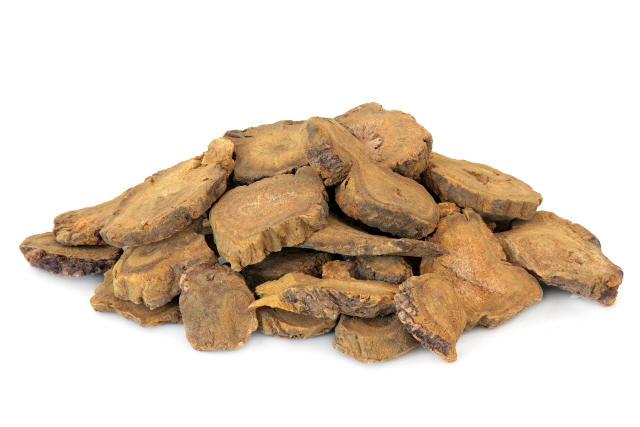Finding A Guiding Herb Makes Easier to Find the Most Efficient Formula (19) Da Huang 大黃
Should Be Cautious To Patient With Various Emptiness Symptoms
By Hyunchang Cho, L.Ac., Ph.D (c0454445@gmail.com)
|
★Da Huang Symptom Indicator Score++ Frequency of Use++
|
1. Pharmacological Hypothesis of Da Huang
|
Stagnation of food toxins → constipation, stomach fullness and irritability, and sometimes Congested Food |
||||||
|
↓ |
↓ |
↓ |
↓ |
|||
|
Increase in blood toxins (due to overload of the detoxification process in the liver) → purulent boils |
Increase in blood wastes and platelet aggregation → Increased blood viscosity, poor blood circulation → producing stagnated blood (dark and clotted dead blood) |
Increased blood toxins → toxic blood go to the brain → symptoms of mental dysfunction such as disoriented speech, psychotic tantrums, and such. |
Fever due to heat disorders are triggered/aggravated. |
|||
|
↓ |
↓ |
↓ |
↓ |
|||
|
Da Huang contains Sennoside, which ①Stimulates the submucosal nerve plexus in the large intestine → promotes peristaltic movement and ②Inhibits water and Na+ uptake to absorb less water in the large intestine → induces diarrhea to drive out accumulated feces |
||||||
(1) Sennoside in Da Huang stimulates the submucosal nerve plexus in the large intestine, promoting peristaltic movement and inhibiting water and Na+ uptake from absorbing less water in the large intestine, thereby inducing diarrhea to drive out accumulated feces and relieve constipation. There are several other therapeutic effects of Da Huang besides relieving constipation.
(2) Da Huang can treat purulent boils, which are caused by the stagnation of food toxins in the GI tract leading to increased blood toxins from the overload of the liver detoxification process.
(3) Da Huang can also treat stagnated blood (dark and clotted dead blood) by inhibiting platelet coagulation and the production of blood wastes due to constipation.
(4) Da Huang can also treat symptoms of mental dysfunction caused by stagnation of food toxins in the GI tract → increase in blood toxins → toxic blood going to the brain → disoriented speech, psychotic tantrums, and such.
(5) High fevers in heat disorders are triggered/worsened by constipation. Relieving constipation with Da Huang will have antipyretic effects. In Shang Han Lun, fevers from external heat disorders were treated with Da Cheng Qi Tang, using the laxative effects of Da Huang.
(6) Da Huang also has diuretic effects and may treat dysuria.
- Da Huang’s diuretic effects are achieved by inhibiting Na+, K+, and ATPase activation.
- Administering Emodin and Rhein to white mice will have diuretic effects while increasing Na+ or K+ elimination and alkalizing urine.
(7) Da Huang promotes bile secretion and protects the liver. Therefore, Da Huang can assist in treating liver problems by inhibiting GOT, GPT, and total bilirubin, which are increased when an accumulation of bile causes hepatitis.
2. Clinical Signs for using Da Huang
(1) Main Symptoms
|
* Without proper daily bowel movement, the level of discomfort caused by constipation, stomach gas, and distension would be high. |
In clinical practice, we can consider Da Huang in the following situations:
① Complain of stomach gas, distension, and discomfort if they cannot have a proper daily bowel movement for 1 or 2 days.
② When patients complain of stomach gas, distension, and discomfort from the feelings of residual stool (tenesmus). If one of the above two symptoms is present, we can consider using Da Huang. Da Huang patients usually suffer from chronic constipation and defecate once every few days with difficulty. Even when they have the urge to defecate, it takes a long time, and the stools will be dry and hard, making it hard to release them. But remember that with Da Huang, the patient’s level of discomfort from improper bowel movement is more important than the symptoms themselves.
Cases for using Da Huan are: Even if patients have a daily bowel movement or visit the bathroom 2-3 times a day due to feelings of residual stool (tenesmus), stools are thin and soft. Complaint of Stomach gas, distension, and discomfort from being unable to have a proper bowel movement at a given time is worsened by feelings of residual stool (tenesmus).
(2) Possible Symptoms
|
*Clinical Tips of Congested Food: When patients with mild constipation or normal stool are Excessive Types (obese or well-built, with strong stamina, good appetite, and frequent overeating). * Show signs of purulent boils (reddish lumps filled with yellow pus), external signs of stagnated blood, fever, delirium, or psychotic tantrums from febrile diseases. *Others: Constipation can lead to stomach gas, distension, and pain. |
































